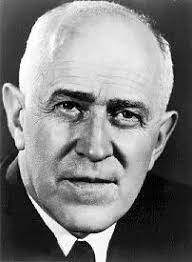Ogburn, William Fielding

Bio: (1886-1959) American sociologist. William Fielding Ogburn received his doctorate from Columbia University and taught there and at the University of Chicago. Ogburn is best known for his theory of cultural change. He was the leader of the Research Committee on Social Trends in the administration of US President Herbert Hoover, and as part of that function, he supervised the preparation of a report published in the two-volume book Recent Social Trends (1933). This book presents data related to a large number of different areas, but it is especially important because in it Ogburn presented his theory of "cultural lag" that occurs when social change happens. Ogburn believes that changes in different spheres of culture and society are not happening at the same pace. Technological and scientific changes most often occur first, followed by changes in the economy and other social spheres related to technology, followed by changes in the spheres of family life, government, education, etc., and finally, changes happen in societal values and norms. It is precisely this lagging behind of changes in other spheres, in relation to changes in technology, that is the essence of the theory of cultural lag.
The process of technological change, itself, goes through four phases: invention, accumulation, diffusion, and adjustment. The invention is the process of creating new technology. New technologies emerge only when there are sufficient levels of knowledge and technology in an area. Accumulation is the process of increasing the total number of technologies used at the same time, in a society. Diffusion is the expansion of technologies between two societies or cultures. Adjustment is the last phase in which non-technological aspects of culture are adapted to inventions. Ogburn calls periods in which changes in other spheres have not yet been harmonized with technological changes periods of "maladaptation". Ogburn's theory of cultural and social change contains aspects of technological determinism, not only because it pays the most attention to technology, which causes a change in other areas, but also because it pays little attention to great historical events or influential individuals.
Theoretical approaches
Chicago SchoolMain works
Social Change with Respect to Culture and Original Nature (1922);
The Social Sciences and Their Interrelations (1927);
Recent Social Trends, 2. vols. (1933);
Social Characteristics of Cities (1937);
Sociology (1940);
Technology and the Changing Family (1955);
On Culture and Social Change: Selected Papers (1964).

